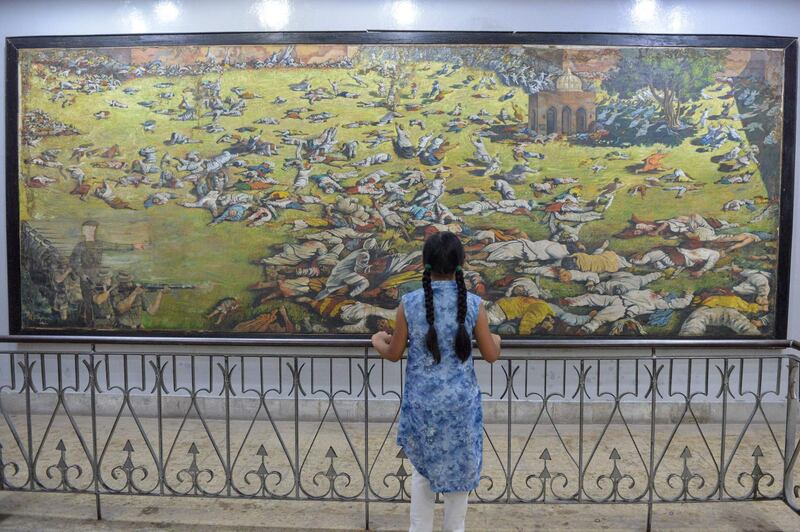On April 13, 1919, Brigadier General Reginald Dyer of the British Indian Army ordered the 50 men under his command to fire into a crowd peacefully gathered in a large walled garden in the city of Amritsar. The shooting continued for 10 minutes, until his troops’ ammunition was nearly exhausted. There was no doubt that the toll of at least 379 killed and 1,000 wounded was intentional – much of the firing was directed at the gates through which people were trying to flee.
Now, the assembly of the Indian state of Punjab is among the many institutions and individuals calling for the 100th anniversary of the Amritsar Massacre this coming weekend to be marked by a formal apology from the British government.
A similar admission of guilt has been demanded by Andrés Manuel López Obrador, the president of Mexico, from the Pope and the king of Spain on the 500th anniversary of the beginning of the Spanish conquest of the Americas. AMLO, as he is known, wants both to say sorry for the killing of indigenous peoples and the attempted destruction of their cultures. “The offences that the original peoples suffered should be recognised,” he has said.
There is no doubt that both examples constitute atrocities. The question now is whether, so long after those events, it is appropriate – or in any way meaningful – for generations far removed from their commission to make official apologies.
In the first case, the UK House of Lords debated the issue relatively recently, but the then prime minister David Cameron said “no” when he visited the Jallianwala Bagh public gardens in Amritsar in 2013. He described the massacre as a “deeply shameful event”, but pointed out that it was something “that happened a good 40 years before I was even born, and which the British government rightly condemned at the time”. Indeed. The British war secretary in 1919, Winston Churchill – no friend to India – described it as “a monstrous event”, while the former Liberal prime minister HH Asquith said it was “one of the worst outrages in the whole of our history”. Some would say no more is necessary today.
In the second case, Spain’s foreign minister, Josep Borrell, said he would no more apologise to Mexico than he would ask France to make amends for the Napoleonic invasion of his country in the early 19th century. The Mexican historian Alfredo Avila concurred. “It would be like France demanding that Italy ask it for forgiveness because Julius Caesar conquered Gaul,” he tweeted. It has also been pointed out that it was the Spanish who became Mexican who inflicted the worst on the original American peoples, not the ones who stayed at home. So are the wrong people being asked to express remorse?
There are definitely occasions when apologies are appreciated. British governments have issued them over their historic responsibility for the Irish potato famine in the 19th century and the Bloody Sunday killings of 1972. One can't help feeling that they are slightly undermined, however, by the fact that Britain has never apologised for colonising Ireland in the first place, and its subsequent ill-treatment of the indigenous Irish people, their language, religion and rights. Then again, it's worth remembering that Britain hasn't even fully decolonised yet. It still occupies the six counties of Northern Ireland.
Anyone who objects to that characterisation should consider this: what if the Netherlands had imported enormous numbers of Dutch people to a particular part of its East Indies empire, then when Indonesia, as it became, achieved independence, the Netherlands insisted that that one geographical area remain Dutch, on the grounds of local self-determination? It would be laughed out of the court of public opinion. Britain, on the other hand, has got away with doing precisely that.
The point is that apologies without proper historical understanding are easy to make, but lack substance. What matters most is a formal acknowledgement of historical facts. This includes ensuring that the education systems in colonising nations give a true picture of what colonisation entailed, and that full discussion of the long-term structural legacies of empire take place.
In the case of Amritsar, the distinguished Indian writer Kishwar Desai and her husband, the Indian-British peer Meghnad Desai, have argued that these legacies make an apology both relevant and necessary. "Many urban centres were destroyed for decades. Thousands of households were left without an earning male member, as a majority of those who were massacred and others who were imprisoned and tortured, were still young. This led to a destruction of Amritsar's thriving economy and arrested the growth of the educated middle class," wrote Lady Desai in February, describing the massacre as "a deep wound that needs to be recognised."
She has just published a book on the massacre and is right to say that “those who have not apologised may not be aware of the truth of what happened 100 years ago”. Similarly, the populations of many former imperial powers are ignorant of their pasts and the extent to which their present-day wealth was built on the sweat and stolen treasures of their one-time colonial possessions. That is, when they are not in denial, as many Japanese clearly are about their actions in Korea in particular.
So my view is that sorry isn’t the hardest word, if you don’t properly know what you’re apologising for, and that understanding is what is most important. However, if the calls for apologies help generate better knowledge and awareness, that may be as valuable as a mea culpa itself.
Sholto Byrnes is a Kuala Lumpur-based commentator and consultant and a corresponding fellow of the Erasmus Forum





